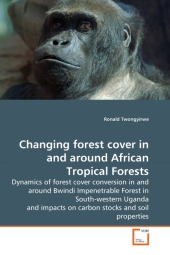 Neuerscheinungen 2010Stand: 2020-01-07 |
Schnellsuche
ISBN/Stichwort/Autor
|
Herderstraße 10
10625 Berlin
Tel.: 030 315 714 16
Fax 030 315 714 14
info@buchspektrum.de |

Ronald Twongyirwe
Changing forest cover in and around African Tropical Forests
Dynamics of forest cover conversion in and around Bwindi Impenetrable Forest in South-western Uganda and impacts on carbon stocks and soil properties
2010. 112 S.
Verlag/Jahr: VDM VERLAG DR. MÜLLER 2010
ISBN: 3-639-28401-1 (3639284011)
Neue ISBN: 978-3-639-28401-0 (9783639284010)
Preis und Lieferzeit: Bitte klicken
African tropical forests are providing important ecosystem services by storing carbon and being a carbon sink, thereby reducing the rate of increase of atmospheric carbon-dioxide. These forests are however clearly sensitive to land use and climatic changes, and past events may have left their signature on present day forests. With adequate protection these forests are likely to remain large carbon stores in the longer term. The reduction of forest area is mainly due to expansion of agricultural land and this has been linked to reduction in soil quality. This study examines the trend in forest cover change between 1973 and 2010 and identifies their drivers; quantifies the effects on carbon stocks and soil properties. Image analysis, field study and laboratory work were done. This book provides empirical evidence on forest conversion dynamics and how they have affected carbon stocks and soil properties in and around BIF, a forest with great bio-diversity and popular for gorilla tourism in Uganda. This work is relevant to a wide range professionals, practitioners, politicians, development agencies and all interested in safeguarding our environment for future generations.
Ronald Twongyirwe; MSc. Environment and Natural Resources (Makerere University, 2010). Ronald has been involved in research in land use and management. He has characterized land use/cover changes from natural vegetation to agricultural land uses, how these conversion practices have impacted on carbon stock, soil characteristics and livelihoods.


